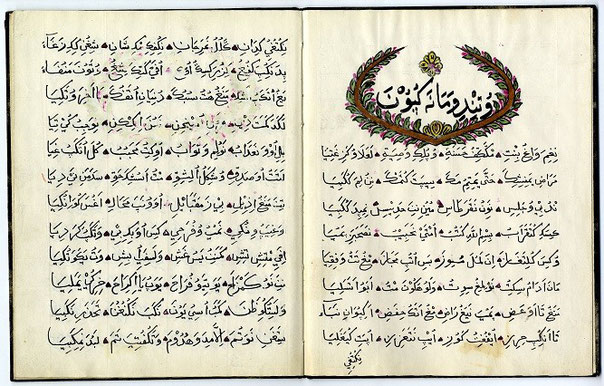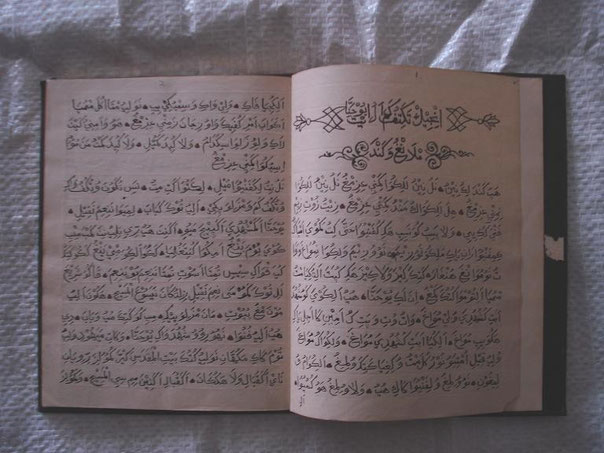Back to Table of Contents
(1)
Medieval Authors about East Africa
By Pieter Derideaux
-----------------------------------------------
No Books have appeared on this subject for many years. This is strange as a number have appeared concerning West Africa. To fill this void I try making these texts available to everybody. When
using these texts;(in e.g. articles or on a website) please mention my name; I worked years on collecting - translating them. No commercial use allowed.
Pieter Derideaux
Contents(2) :
Color Code
Muslim World
Chinese Empire
Christian World
India
(Muslim+Hindu)
South East Asian
States
Neighboring African States
-Al Tabari (922)
-Zahariya al Razi (925)
-Al Battina (929)
-Qadama (930)
-Sri Mpu Sindok (931)
-Ibn Durayd (d933)
-Abu I Tayyib M. al-Washsha (d936)
-Al Kulayni (d939)
-Liu Xu (940)
-Note on Zangi Slaves
-Kitab Ikhwan as-Safa (950)
-Hu Kiao (953)
-Buzurg (955)
-Buzurg notes and conclusions

Above and under pages of a Quran (in Arabic) from Mogadishu from the 18th Century.

As illustration only are added here some examples of the finest manuscripts from the Swahili. They are not connected with the list of authors on the left side of the page.

On top, first 20 verses of the popular poem Utendi composed by Mwana Kupona (±1858); MS H 58 copied by the scribe Muh’d Kijuma in ±1915, Asia-Africa-Institute, UHamburg.
Above the text is written: ‘from Lamu.’
The poet is Mwana Kupona, wife of Bwana Mat̪aka, the longtime ruler of Siu. The scribe is M[uhamadi] K[idjumwa]. The colophon contains not only the name of the scribe, but also the date, the 3rd of Sha’aban, 1331AH. The poet, who lived in the first half of the 19th century and died in 1860, was given the name Kupona by her parents. According to N[abhany], that happened because at least one of her older siblings had died before her birth. With the name Kupona (‘healthy, escaped, saved’), they had hoped to protect the child from illness and death. Mwana Kupona composed this poem about two years before her death for the education of her daughter Mwana Hashima binti Sheikh. It contained an explanation of the obligations which behoved a well-raised woman in the Swahili environment at that time, consisting of religious duties as well as the right behaviour at home and with the family, especially their husbands. In the second part of her poem, Mwana Kupona prays to Allah to be merciful to her and her kin. She also prays for the forgiveness of her own sins.
Under a page from another manuscript of the same poem.


Old hand written Bible in Kiswahili Arabic script. It’s over a hundred years old. It has a beautiful binding of Elephant skin with very good Islamic calligraphy. It has 86 pages. The inside part which looks like a sticker reads in Kiswahili Arabic “kitabu hiki nimali yangu mimi John Williamson” which means “this Bible belongs to me John Williamson”. AND THE INSIDE CALIGRAPHY IN WREATH READS in kiswahili kama ilivyoitwa injil Yohana which means like it was mentioned in the Gospel of John.
Copyright 2002-2005 Pieterderideaux
No part or portion of these pages, text(s), image(s) or code(s) may be copied, reproduced, published or distributed by whatever way in any medium without
the expressed written permission of the copyright holder, unless you use the above mentioned matter for personal educational or scientific purposes with no intention of publishing it by whatever
way under your or any other name.